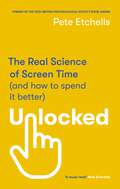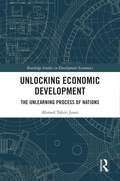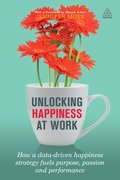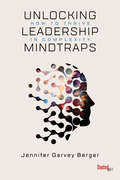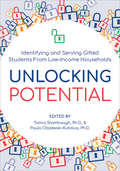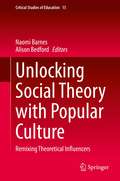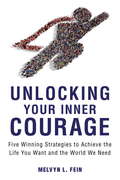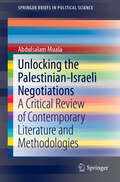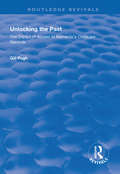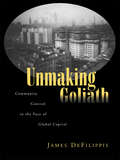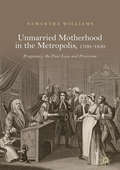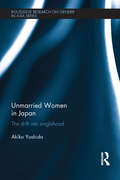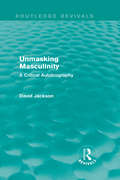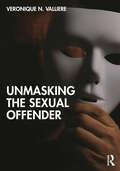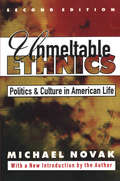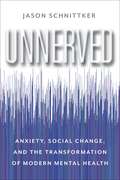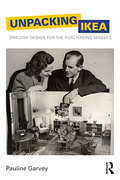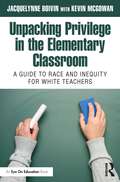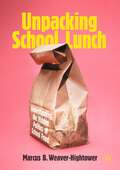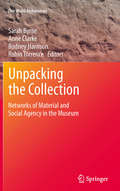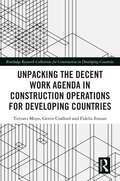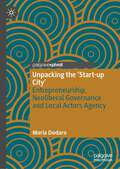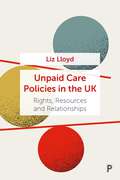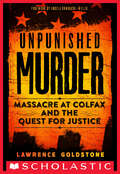- Table View
- List View
Unlocked: The Real Science of Screen Time (and how to spend it better)
by Pete Etchells'A welcome counterpoint to the technopanic that screen time is causing a mental health crisis' Bruce Hood 'A rare mix of trustworthy science, practical advice, and human stories ... I'm going to recommend it to all the parents I know, and keep it handy for reference next time I see a scary headline about how technology is ruining our lives' Timandra HarknessMost of us spend a significant part of the day in front of a screen. Our work and social lives play out through our computers, tablets and phones: on email, social media, video conference calls and gaming servers. But what is all this screen time doing to our health, our sleep, and our relationships?Professor Pete Etchells studies the way we use screens, and how they can affect us. In UNLOCKED, he delves into the real science behind the panic about our alleged device addiction and withering attention spans. Armed with the latest research, he reveals how little we have to fear, and the great deal we have to gain, by establishing a more positive relationship with our screens. That begins with asking ourselves some essential questions about how we use them.Instead of clamouring for us to ditch our devices (before guiltily returning to the same old habits), UNLOCKED is a sustainable, realistic and vital guide to transforming our connection with technology.
Unlocked: The Real Science of Screen Time (and how to spend it better)
by Pete Etchells'A welcome counterpoint to the technopanic that screen time is causing a mental health crisis' Bruce Hood'A rare mix of trustworthy science, practical advice, and human stories ... I'm going to recommend it to all the parents I know, and keep it handy for reference next time I see a scary headline about how technology is ruining our lives' Timandra Harkness'Punctures some of the most pernicious myths about our smartphone and screen-dominated lives, while offering good advice about how to improve the time we spend with screens ... a must-read' New ScientistMost of us spend a significant part of the day in front of a screen. Our work and social lives play out through our computers, tablets and phones: on email, social media, video conference calls and gaming servers. But what is all this screen time doing to our health, our sleep, and our relationships?Professor Pete Etchells studies the way we use screens, and how they can affect us. In UNLOCKED, he delves into the real science behind the panic about our alleged device addiction and withering attention spans. Armed with the latest research, he reveals how little we have to fear, and the great deal we have to gain, by establishing a more positive relationship with our screens. That begins with asking ourselves some essential questions about how we use them.Instead of clamouring for us to ditch our devices (before guiltily returning to the same old habits), UNLOCKED is a sustainable, realistic and vital guide to transforming our connection with technology.
Unlocking Economic Development: The Unlearning Process of Nations (Routledge Studies in Development Economics)
by Ahmed Tahiri JoutiDespite the abundant literature about development policies and solutions, many developing countries continue to struggle with basic development issues. The author of this book argues that such a situation is due to the absence of an unlearning process that would aid in adjusting negative mindsets and outdated mental models that hinder economic development.This book addresses development issues from the behavioral perspective, linking negative mindsets and behaviors to growth and development strategies and policies. It identifies six mindsets and actions that impede the economic development of underdeveloped nations. Then, it suggests solutions to upgrade the mindsets according to the plans and policies. Moreover, the book highlights the different concepts and phenomena in a straightforward way with simple figures to facilitate their understanding for people who do not necessarily have a background in business or economics. At the same time, it fully respects scientific standards in addressing the topics and themes under discussion. Each chapter identifies the state of mind needed to ‘unlearn’ with real examples and experiences and offers suggestions to undertake and accomplish the unlearning process.Based on real and clear-cut examples, the book presents the main beliefs and psychological mechanisms that lead to underperforming behaviors of customers, investors, entrepreneurs and policy makers. Thus, the main audience for the book is scholars, students and researchers in economics and development, as well as policymakers, wishing to attempt new approaches to counteract the boomerang effect.
Unlocking Happiness at Work: How a Data-driven Happiness Strategy Fuels Purpose, Passion and Performance
by Jennifer MossUnlocking Happiness at Work takes you on a journey into why and how leaders should become compassionate capitalists and ensure that their teams thrive. This book debunks the myth that happiness at work is a waste of time and demonstrates how it can deliver a more productive and engaged workforce, which can have real impact on the bottom line. Based on two decades of scientific research, real-time data, interviews and case studies, this book proves that happiness fuels higher performance, provides a greater sense of purpose and spreads passion throughout organizations. With insightful practical guidance throughout, Unlocking Happiness at Work is a lively and persuasive exploration of how to be happier and make others happier through the power of habits, emotional intelligence and an innovative approach to work/life flow. Case studies from lululemon, Zappos, Misfit Inc, The Body Shop and more are supported by tangible data and key performance indicators that show the significant benefits that come from adopting a happiness strategy. This is an essential resource for leaders who want to increase sustainability, attract new talent, improve their brand and boost profitability - in a way that is life-enhancing for them and their people.
Unlocking Leadership Mindtraps: How to Thrive in Complexity
by Jennifer Garvey BergerAuthor and consultant Jennifer Garvey Berger has worked with all types of leaders – from top executives at Google to nonprofit directors who are trying to make a dent in social change. She hears a version of the same plea from every client in nearly every sector around the world: "I know that complexity and uncertainty are testing my instincts, but I don't know which to trust. Is there some way to know what to do when I can't know what's next?" Her newest work is an answer to this plea. Using her background in adult development, complexity theories, and leadership consultancy, Garvey Berger discerns five pernicious and pervasive "mind traps" to frame the book. These are: the desire for simple stories, our sense that we are right, our desire to get along with others in our group, our fixation with control, and our constant quest to protect and defend our egos. In addition to understanding why these natural impulses steer us wrong in a fast-moving world, leaders will get powerful questions and approaches that help them escape these patterns.
Unlocking Potential: Identifying and Serving Gifted Students From Low-Income Households
by Paula Olszewski-Kubilius Tamra StambaughThis edited book, written by authors with extensive experience in working with gifted students from low-income households, focuses on ways to translate the latest research and theory into evidence-supported practices that impact how schools identify and serve these students. Readers will:Learn about evidence-supported identification systems, tools, and strategies for finding students from low-income households.Discover curriculum models, resources, and instructional strategies found effective from projects focused on supporting these students.Understand the important role that intra- and interpersonal skills, ethnicity/race, families, school systems, and communities play.Consider the perceptions of gifted students who grew up in low-income households.Learn how educators can use their experiences to strengthen current services.Unlocking Potential is the go-to resource for an up-to-date overview of best practices in identification, curriculum, instruction, community support, and program design for gifted learners from low-income households.
Unlocking Social Theory with Popular Culture: Remixing Theoretical Influencers (Critical Studies of Education #15)
by Naomi Barnes Alison BedfordThis book demonstrates how pop culture examples can be used to demystify complex social theory. It provides tangible, metaphorical examples that shows how it is possible to "do philosophy" rather than subscribe to a theorist by showing that each theorist intersects and overlaps with others. The book is embedded in the literary theory that tapping into background knowledge is a key step in helping people engage with new and difficult texts. It also acknowledges the important role of popular culture in developing comprehension. Using a choose your own adventure structure, this book not only shows students of social theory how various theories can be applied but also reveals the multitude of possible pathways theory provides for comprehending society.
Unlocking Your Inner Courage
by Melvyn FeinCourage is not just for heroes. It is a virtue that everyone can possess. This book will teach you how to develop the courage you never knew you had. Building upon his fifty-year career as a clinician and professor of sociology, Dr. Melvin Fein demonstrates why courage is the key to leading a successful life. He presents a five-step, reality-tested program that enables ordinary people to live up to their potential. Fein begins by explaining how to find "safe places" that provide a refuge from worries and threats. Then, with refreshing candor and common sense, he supplies tactics for tolerating fears and evaluating the best means of dealing with them. Next he demonstrates strategies that produce winning results. In our increasingly complex, middle-class society, there are few guarantees. Fein convincingly argues that self-reliance is the most dependable approach. Freedom from fear is liberating. But it must be earned. This book shows that this is not only possible, but within the grasp of the average person.From the Trade Paperback edition.
Unlocking the Palestinian-Israeli Negotiations: A Critical Review of Contemporary Literature and Methodologies (SpringerBriefs in Political Science)
by Abdulsalam MualaThis book offers a critical review of contemporary literature on the Palestinian-Israeli negotiations. Its goal is to highlight the shortcomings of the methods that have been used to date to analyse the underlying causes that have led to a stalemate in the negotiation process. Further, it pursues an approach that considers the multiple factors that can influence the outcomes of the negotiation process. The book represents a substantial academic contribution to the field of conflict resolution by broadening the scope of the analytical framework that is needed to analyse the Palestinian-Israeli negotiations, and bridging the gap between theory and practice. Accordingly, it offers a valuable asset for researchers and students interested in political theory, Middle Eastern studies, international relations, conflict resolution studies, political science, negotiation theory, and contemporary Arab studies and Israeli studies.
Unlocking the Past: The Impact of Access to Barnardo's Childcare Records (Routledge Revivals)
by Gill PughPublished in 1999, this text explores the impact of access to child care records, specifically upon adults who grew up in the care of Barnardo's. Most of the adults studied had reached their middle years with little or no knowledge of their family background or reasons for admission to care. The book researches the links between quality of care in childhood and the intensity of "need to know" about origins in later life. It looks at the complex process of assimilating information, and the need for such information to be imparted with skillful judgement and sensitivity. The implications for service provision for those seeking access to their records is highlighted, as well as for current child care practitioners. Requests for access to care records at Barnardo's have grown from around 1500 a year prior to 1995, to several thousand in one month alone following media publicity about the opening up of Barnardo's records. Other organizations are just beginning to recognize the growing demands for this service. This text aims to use these studies to examine the impact, particularly upon sense of identity, of ignorance about one's origins and the effects of acquiring such information later in life
Unmaking Goliath: Community Control in the Face of Global Capital
by James DeFilippisArguing against those who say that our communities are powerless in the face of footloose corporations, DeFilippis considers what localities can do in the face of heightened capital mobility in order to retain an autonomy that furthers egalitarian social justice, and explores how we go about accomplishing this in practical, political terms.
Unmarried Motherhood in the Metropolis, 1700–1850: Pregnancy, The Poor Law And Provision
by Samantha WilliamsIn this book Samantha Williams examines illegitimacy, unmarried parenthood and the old and new poor laws in a period of rising illegitimacy and poor relief expenditure. In doing so, she explores the experience of being an unmarried mother from courtship and conception, through the discovery of pregnancy, and the birth of the child in lodgings or one of the new parish workhouses. Although fathers were generally held to be financially responsible for their illegitimate children, the recovery of these costs was particularly low in London, leaving the parish ratepayers to meet the cost. Unmarried parenthood was associated with shame and men and women could also be subject to punishment, although this was generally infrequent in the capital. Illegitimacy and the poor law were interdependent and this book charts the experience of unmarried motherhood and the making of metropolitan bastardy.
Unmarried Women in Japan: The drift into singlehood (Routledge Research on Gender in Asia Series)
by Akiko YoshidaYoshida addresses the common misconceptions of single, never-married women and aims to uncover the major social and cultural factors contributing to this phenomenon in Japan. Based on interviews with married and never-married women aged 25-46, she argues that the increasing rate of female singlehood is largely due to structural barriers and a culture that has failed to keep up with economic changes. Here is an academic book that is also reader-friendly to the general audience, it presents evidence from the interview transcripts in rich detail as well as insightful analysis. Important sociological concepts and theories are also briefly explained to guide student readers in making connections. Thus, this book not only serves to enlighten readers on current issues in Japan – it also provides sociological perspectives on contemporary gender inequality.
Unmasking Masculinity: A Critical Autobiography (Routledge Revivals)
by David JacksonIn this detailed investigation of ‘masculine’ gendered identity, first published in 1990, David Jackson uses his own personal history to look at the specific ways in which men become ‘masculine’. In doing so he examines, but also offers some positive challenges to, the assumed qualities and values of growing up ‘manly’. Jackson looks closely at the psychological and social forces active in his own development: relations with his father, violence at school, male banter and joking, sporting activities, boys’ comics, and sexual relations. The title is a deliberate blend between life story and critical commentary that makes use of some areas of post-structuralist theory to make visible the social and emotional processes that contribute to one man’s life history. With an innovative theoretical approach, this reissue will be of particular value to those interested in the social, psychological and cultural forces that have gone into the historical shaping of men and masculinities.
Unmasking the Sexual Offender
by Veronique N. ValliereThis book unmasks the sexual offender by providing clear, comprehensible information about the motivations, techniques, and dynamics of sexual offenders and their behavior. It not only explores the biases and myths that the reader may rely upon to understand deviance but also explains pathways to offending, the distorted thinking and relating that offenders engage in, and the ways offenders manipulate and exploit others. Sexual offenders are surrounded by mythology, fascination, and revulsion. People who commit sexual offenses present difficult and complicated issues interpersonally, as well as in treatment and management; denial, victim-blaming, aggression, and blatant chronic deception are inherent in interactions with them. Unfortunately, the failure to truly understand their motives and techniques helps provide excuses for and further camouflage of their deviance. The first part of the text explores the presumptions commonly adopted about sexual offenders and shows how misinformation supports the inappropriate behavior of the sexual offender. The second section focuses on exposing the sexual offender using straightforward language and tangible examples. A final, third section includes safety and management strategies for dealing with sex offenders for those both inside and outside the realms of law enforcement and offender supervision. This book is intended for anyone interested in learning about sexual offenders. It is useful for both professionals and non-professionals, including students, paralegals, victim advocates, and others involved in the criminal justice system or mental health field.
Unmeltable Ethnics: Politics and Culture in American Life
by Michael NovakThis new, enlarged edition of an influential book originally published in 1972 as The Rise of the Unmeltable Ethnicsextends the author's wise and generous view of ethnicity. Its aim "is to raise consciousness about a crucial part of the American experience: to involve each reader in self-inquiry. Who, after all, are you? What history brought you to where you are? Why are you different from others?" But the point of such inquiry is civility: "The new ethnic consciousness embodied in this book delights in recognition of subtle differences in the movements of the soul. It is not a call to separatism but to self-consciousness. It does not seek division but rather accurate, mutual appreciation."This new edition contains six new essays by the author, including the acclaimed "Pluralism: A Humanistic Perspective." New, too, is Novak's comprehensive introduction, bringing the argument up to date. Novak describes how and why ethnicity has become a prominent issue in American politics. He also sharply denounces the current ideology of "multiculturalism" as a disfiguration of genuine ethnicity. "Multiculturalism is moved by the eros of Narcissus" Novak writes, "the new ethnicity is driven by the eros of unrestricted understanding."When the book first appeared, Time said that "Novak has attacked the American Dream in order to open up a possible second chapter for it." Newsweek called it "a tough-minded, provocative book which could well signal an important change in American politics."This new edition adds crucial distinctions for those seeking an intelligent path through such current-day mystifications as "multiculturalism" and "diversity." Twenty-five years ago, Novak's argument led the way in focusing on families, neighborhoods, and other "mediating institutions" of civil society. It is an argument critical to a realistic sense of national community.
Unnerved: Anxiety, Social Change, and the Transformation of Modern Mental Health
by Jason SchnittkerAnxiety is not new. Yet now more than ever, anxiety seems to define our times. Anxiety disorders are the most common psychiatric disorders in the United States, exceeding mood, impulse-control, and substance-use disorders, and they are especially common among younger cohorts. More and more Americans are taking antianxiety medications. According to polling data, anxiety is experienced more frequently than other negative emotions. Why have we become so anxious?In Unnerved, Jason Schnittker investigates the social, cultural, medical, and scientific underpinnings of the modern state of mind. He explores how anxiety has been understood from the late nineteenth century to the present day and why it has assumed a more central position in how we think about mental health. Contrary to the claims that anxiety reflects large-scale traumas, abrupt social transitions, or technological revolutions, Schnittker argues that the ascent of anxiety has been driven by slow transformations in people, institutions, and social environments. Changes in family formation, religion, inequality, and social relationships have all primed people to be more anxious. At the same time, the scientific and medical understanding of anxiety has evolved, pushing it further to the fore. The rise in anxiety cannot be explained separately from changes in how patients, physicians, and scientists understand the disorder. Ultimately, Schnittker demonstrates that anxiety has carried the imprint of social change more acutely than have other emotions or disorders, including depression. When societies change, anxiety follows.
Unpacking IKEA: Swedish Design for the Purchasing Masses (CRESC)
by Pauline GarveyThis book represents the first anthropological ethnography of Ikea consumption and goes to the heart of understanding the unique and at times frantic popularity of this one iconic transnational store. Based on a year of participant observation in Stockholm’s Kungens Kurva store – the largest in the world - this book places the retailer squarely within the realm of the home-building efforts of individuals in Stockholm and to a lesser degree in Dublin. Ikea, the world’s largest retailer and one of its most interesting, is the focus of intense popular fascination internationally, yet is rarely subject to in-depth anthropological inquiry. In Unpacking Ikea, Garvey explores why Ikea is never ‘just a store’ for its customers, and questions why it is described in terms of a cultural package, as everyday and classless. Using in-depth interviews with householders over several years, this ethnographic study follows the furniture from the Ikea store outwards to probe what people actually take home with them.
Unpacking Privilege in the Elementary Classroom: A Guide to Race and Inequity for White Teachers
by Jacquelynne Boivin Kevin McGowanBrimming with reflection and resources, this book is ideal for white elementary teachers who wish to host conversations about race with their predominantly white classes.This book is a clear-cut guide for integrating antiracism into teaching and education, along with policy reform needed for systemic change. Providing hands-on experience and practical insights from literature, it breaks down subject-specific strategies to approach racial conversations. The book acknowledges the variety of challenges that teachers face and encourages them to continue self-work as a step towards supporting students.While specifically targeting all-white and predominantly white classrooms, this resource is suitable for additional professional development and educator preparation programs when considering a variety of racial dynamics.
Unpacking School Lunch: Understanding the Hidden Politics of School Food
by Marcus B. Weaver-HightowerThis book delves into the heated political battles over what kids eat at school, shedding light onto how policymakers craft food policy for schools. The book takes readers inside schools, through the history of school food programs in the United States and England, and into the policy terrain that makes school lunch difficult to change. Through diverse case studies—hungry linebackers, pink slime, English reality television and policy making, pizza as a vegetable, lunch shaming, and more—chapters provide detailed analysis of rhetorical tactics, arguments over, and policy for school feeding. The book concludes with a progressive vision of school food that is healthy, pleasurable, educative, shame-free, and, most importantly, free for all students, just like the rest of school.
Unpacking the Collection
by Rodney Harrison Anne Clarke Sarah Byrne Robin TorrenceMuseum collections are often perceived as static entities hidden away in storerooms or trapped behind glass cases. By focusing on the dynamic histories of museum collections, new research reveals their pivotal role in shaping a wide range of social relations. Over time and across space the interactions between these artefacts and the people and institutions who made, traded, collected, researched and exhibited them have generated complex networks of material and social agency. In this innovative volume, the contributors draw on a broad range of source materials to explore the cross-cultural interactions which have created museum collections. These case studies contribute significantly to the development of new theoretical frameworks to examine broader questions of materiality, agency, and identity in the past and present. Grounded in case studies from individual objects and museum collections from North America, Europe, Africa, the Pacific Islands, and Australia, this truly international volume juxtaposes historical, geographical, and cross-cultural studies. This work will be of great interest to archaeologists and anthropologists studying material culture, as well as researchers in museum studies and cultural heritage management.
Unpacking the Decent Work Agenda in Construction Operations for Developing Countries (Routledge Research Collections for Construction in Developing Countries)
by Fidelis Emuze Tirivavi Moyo Gerrit CraffordLow construction labour productivity and the inadequate welfare of construction workers are consistent challenges in developing countries. These challenges are partially due to shortcomings situated in the Decent Work Agenda. This book proposes ways of sustaining construction labour productivity through fulfilling the Decent Work Agenda. This is a unique area of focus that is essential to fulfilling the broader and global aspects of decent work, sustainability and construction labour productivity. Also, the focus of this book is on contributing to the plight of construction workers whose treatment is significantly unsound. The construction industry needs to develop a humanistic face and contribute to the UN’s sustainable development goal of achieving full and productive employment and decent work for all women and men. To achieve this, construction companies are encouraged to implement corporate social responsibility strategies by equipping workers of different educational levels with knowledge and skills that can be transferred to benefit themselves and their communities. Thus, establishing structured on-the-job training that incorporates sustainability-learning objectives to achieve workers’ safety on sites is essential. The book advocates for decency in the workplace through people-centred management, sustainability learning of skilled and semi-skilled construction workers and decent working conditions. It will be of interest to construction industry policymakers, construction professionals, academics and students of sustainable development and developing economies.
Unpacking the ‘Start-up City’: Entrepreneurship, Neoliberal Governance and Local Actors Agency
by Maria DodaroThis book provides an invaluable overview of neoliberalising trends in urban policies and governance by presenting novel perspectives on municipal entrepreneurship support policies. It seeks to address a current lack of in-depth empirical knowledge of this topic and the reference literature’s silence on local actors agency. The book ’s scholarly debate around the impact of neoliberal capitalism on cities interweaves with empirical observations in the European cities of Barcelona and Milan with a view to examining what lies behind the “start-up city” label, and the way local actors reproduce, contest and re-signify entrepreneurship policies and practices in a highly individualised context. Based on more than sixty interviews with key policy actors, including young beneficiaries, it sheds light on their representations, motivations, intentions and room for manoeuvre in a way that encompasses local specificities in which multi-scalar economic, social, institutional and cultural processes interact. Finally, this book offers new insights into critical entrepreneurship studies and current debates about convergence and divergence trends in urban policies and governance.
Unpaid Care Policies in the UK: Rights, Resources and Relationships
by Liz LloydThis book examines policies on unpaid care throughout the UK since the 1990 NHS and Community Care Act. It questions why, after decades of policies and strategies, unpaid care remains in a marginal position in the social care system and in society more broadly, as demonstrated during the COVID-19 pandemic. It provides critical analysis of key policies and professional practice over three decades and highlights the continuing challenges faced by people in caring relationships, as well as reflecting on developments in the position of unpaid carers in the system of social care. By questioning why this crucially important sphere of human life remains under-resourced, it sheds light on the ways in which care is understood and how policy makers and service providers perceive the need for support.
Unpunished Murder: Massacre at Colfax and the Quest for Justice
by Lawrence GoldstoneHow the Supreme Court turned a blind eye on justice, stripped away the equal rights promised to all Americans, and ushered in the era of Jim Crow.On Easter Sunday of 1873, just eight years after the Civil War ended, a band of white supremacists marched into Grant Parish, Louisiana, and massacred over one hundred unarmed African Americans. The court case that followed reached the highest court in the land. Yet, following one of the most ghastly incidents of mass murder in American history, not one person was convicted.The opinion issued by the Supreme Court in US v. Cruikshank set in motion a process that would help create a society in which Black Americans were oppressed and denied basic human rights—legally, according to the courts. These injustices paved the way for Jim Crow and would last for the next hundred years. Many continue to exist to this day.In this compelling and thoroughly researched volume for young readers, Lawrence Goldstone traces the evolution of the law and the fascinating characters involved in the story of how the Supreme Court helped institutionalize racism in the American justice system.“Spotlighting an event seldom discussed in books for young people, Goldstone provides a complex, useful historical context for understanding issues surrounding race and justice.” —Booklist (starred review)“A unique look at not only the massacre in question, but also at the history and workings of the Supreme Court of the United States.” —School Library Connection“The book is, in large part, the story of how racism evolves, persisting in laws and politics despite major social advances.” —The Horn Book (starred review)
